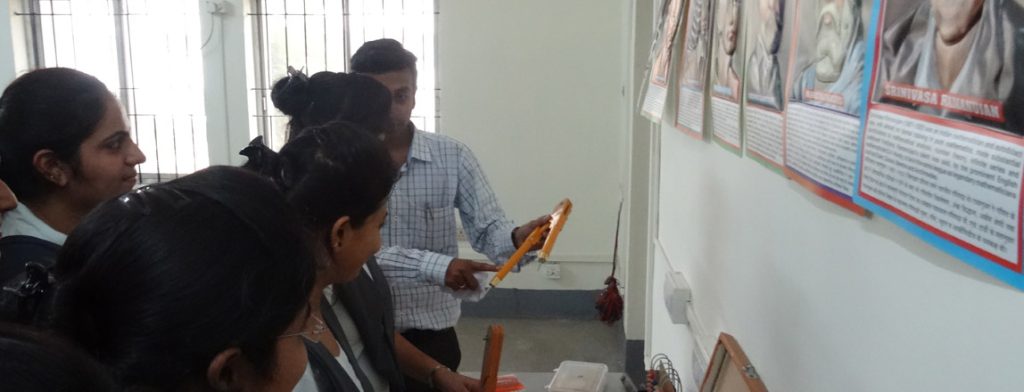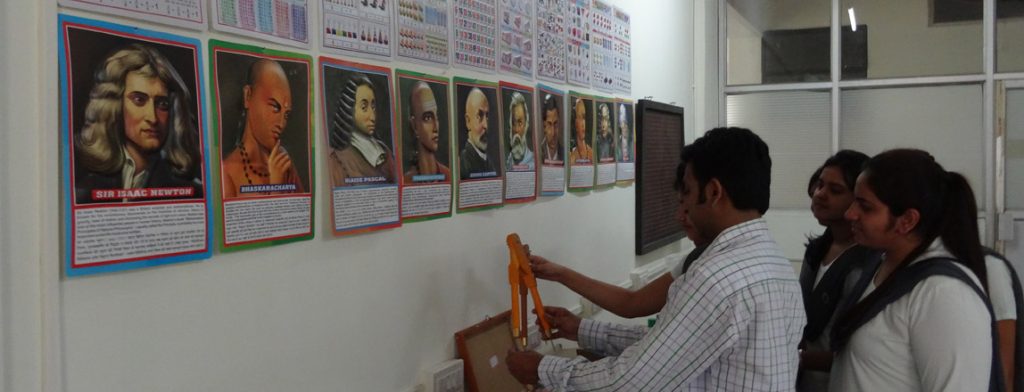Engineering Mathematics


The Department of Mathematics at Bengal College of Engineering & Technology is a cornerstone of academic excellence, playing a crucial role in shaping the analytical and problem-solving abilities of students across multiple disciplines. With a dedicated team of experienced faculty members, the department is committed to delivering high-quality education and fostering a deep understanding of mathematical concepts. Mathematics serves as the foundation for all scientific and engineering disciplines, and our department ensures that this foundation is solid, relevant, and applicable in real-world scenarios.
The department actively supports various engineering branches including Computer Science, Mechanical, Civil, Electrical, and Electronics Engineering, by offering tailor-made mathematics courses that align with the needs of each stream. From Applied Mathematics and Numerical Methods to Probability and Statistics, the curriculum is designed to enhance logical reasoning, quantitative analysis, and the ability to model complex systems.
In addition to engineering, the Mathematics Department also extends its teaching to BBA, BCA, and MBA programs. For BBA and MBA students, mathematics is taught with a focus on business applications, such as quantitative techniques, operations research, financial mathematics, and data analysis. These subjects are crucial for making informed decisions in the fields of marketing, finance, and operations. For BCA students, mathematics supports computer science fundamentals through subjects like discrete mathematics, linear algebra, and graph theory, which are essential for algorithm design and programming.
The faculty members are not only excellent educators but also active researchers who contribute to the academic community through publications, workshops, and seminars. The department encourages a culture of continuous learning and critical thinking among students, supporting them with extra tutorials, problem-solving sessions, and guidance for competitive exams like GATE, CAT, and GRE.
To foster interdisciplinary learning, the department often collaborates with other departments and organizes guest lectures, webinars, and mathematical modelling competitions. The aim is to show students the real-world relevance of mathematics and inspire them to pursue research and innovation.
The Mathematics Department stands as a vital academic unit within the college, enriching the learning journey of students from engineering, management, and computer applications. With a blend of rigorous curriculum, experienced faculty, and a commitment to excellence, the department plays a pivotal role in building the analytical backbone of future professionals and leaders.
Faculty Profile:
Avijit Ghosh, HOD & Assistant Professor
Research Interest: Computational Graph Theory, Fuzzy Mathematics, Operations Research. 2008: M. Sc in Mathematics, Visva Bharti University.
2006: B. Sc Honours in Mathematics, Visva Bharti University. Experience: 14 years
Prabhas Kumar Sen, Assistant Professor
Research Interest: E-Commerce, Optimization Techniques. 2013: M. Sc in Mathematics, Sidho-Kanho-Birsha University.
2011: B. Sc Honours in Mathematics, Ramananda College, Bishnupur, Burdwan University. Experience: 11 years
Kartick Chandra Fentri, Assistant Professor
Research Interest: Functional Analysis, Proximity Theory, Non-linear Analysis. 2013: M. Sc in Mathematics, Sidho-Kanho-Birsha University.
2011: B. Sc Honours in Mathematics, Burdwan University. Experience: 8 years
Bibekananda Adhya, Assistant Professor
Research Interest: Nonlinear Waves, Plasma Physics, Mathematical ecology. 2016: M. Sc in Mathematics, Sidho-Kanho-Birsha University.
2014: B. Sc Honours in Mathematics, J.K. College, Purulia, Sidho-Kanho-Birsha University. Experience: 5 years
Dr. Subhashis Das, Assistant Professor
Former DST–INSPIRE fellow under Department of Science & Technology, Ministry of Science & Technology, Government of India.
Area of Research: Mathematical modelling, Mathematical epidemiology, Nonlinear dynamics, Eco-epidemiology, Fuzzy differential equation, Fractional order differential equation. However, area of research is not limited to these topics. Detail published papers* are given below.
2023: Ph.D. in Mathematical Biology, Sidho-Kanho-Birsha University. 2016: M.Sc. in Mathematics, Sidho-Kanho-Birsha University.
2014: B.Sc. Honours in Mathematics, J.K. College, Purulia, Sidho-Kanho-Birsha University. Experience: 5 years
*Detail published papers:
- Das, S., Mahato, K., Mondal, A., Kaslik, E. Emergence of diverse dynamical responses in a fractional-order slow–fast pest–predator model. Nonlinear Dyn, 111, 8821– 8836 (2023). https://doi.org/10.1007/s11071-023-08292-2
- Das, S., Mukherjee, , Mondal, A., Mistri, K.C., Mahato, S.K., Aziz-Alaoui,
M.A. Traveling pulses and its wave solution scheme in a diffusively coupled 2D Hindmarsh-Rose excitable systems. Nonlinear Dyn,111, 6745–6755 (2023). https://doi.org/10.1007/s11071-022-08168-x
- S Das, J Chattopadhyay, SK Mahato and P Mahato, Extinction and persistence of a harvested prey–predator model incorporating group defence and disease in prey: special emphasis on stochastic environment, Journal of Biological Systems, 30(2), 423–457 (2022). https://doi.org/10.1142/S0218339022500152
- S Das, P Mahato, S K Mahato, A Prey Predator Model in Case of Disease Transmission via Pest in Uncertain Environment, Differ Equ Dyn Syst, 31, 457–483 (2023). https://doi.org/10.1007 /s12591-020-00551-7
- Das, S., Mahato, P. & Mahato, S.K. Disease control prey–predator model incorporating prey refuge under fuzzy Model. Earth Syst. Environ. 7(4), 2149–2166 (2021). https://doi.org/10.1007/s40808-020-00892-w
- S Das, P Mahato, S K Mahato, D Pal, A Mathematical Study of Pandemic COVID-19 Virus with Special Emphasis on Uncertain Environments. Journal of Applied Nonlinear Dynamics 11(2), (2022) 427-457. DOI:10.5890/JAND.2022.06.012.
- S Das, S K Mahato, P Mahato, Biological control of infection pervasive via pest: a study of prey–predator model incorporating prey refuge under fuzzy impreciseness, Int J Model Simul, 42(4), 628-652 (2022).
- Mahato, P., Das, S. & Mahato, S.K. An epidemic model through information-induced vaccination and treatment under fuzzy impreciseness. Model. Earth Syst. Environ., 8, 2863–2887 (2022). https://doi.org/10.1007/s40808-021-01257-7
- S Das, S K Mahato, P Mahato, Stability of a fractional order harvested prey–predator model in the existence of infection in prey, Journal of Scientific Enquiry, 1(1), 134–151 (2021). https://doi.org/10.54280/21/16
- P Mahato, S K Mahato, S Das, A Mathematical Study of COVID-19 Outbreak with Uncertainties of Controlling Parameters, Journal of Scientific Enquiry, 1(1), 114–133 (2021). https://doi.org/10.54280/21/15
- S Das, S K Mahato, P Mahato, Immunity Shield Protection Mathematical Model of SARS- CoV-2 Virus Outbreak with Emphasis on Impreciseness in Terms of Intuitionistic Fuzziness, Journal of Applied Nonlinear Dynamics 12(1) (2023) 1–29, DOI: 5890/JAND.2023.03.001
- Mahato, P., Mahato, S. K., & Das, S. (2022). COVID-19 Outbreak with Fuzzy Uncertainties: A Mathematical Perspective. Journal of Computational and Cognitive Engineering. 1-15. https://doi.org/10.47852/bonviewJCCE2202236
- Mahato, , Das, S., Mahato, S.K., Karmakar, P., Pal, P. Dynamics of a density dependent stage structure prey-predator model under fuzzy and stochastic impreciseness, Journal of Scientific Enquiry, 2(2), 25–39 (2022). https://doi.org/10.54280/jse.222217
- P Mahato, S Das, SK Mahato, Stochastic Permanence and Extinction of an Epidemic Model with Saturated Treatment, Journal of Biological Systems, 31(2), 691–716 (2023). https://doi.org/10.1142/S0218339023500249
- P Mahato, SK Mahato, S Das, P Karmakar, Stationary distribution and density function analysis of SVIS epidemic model with saturated incidence and vaccination under stochastic environments, Theory Biosci., 142, 181 – 198 (2023)
- Mahato, S.K. Mahato and S. Das, A stochastic epidemic model with Crowley–Martin incidence rate and Holling type III treatment, Decision Analytics Journal, 10, 100391, 1 – 12, (2024).
Riti Gupta, Assistant Professor
Research Interest: Complex Analysis, Geometric function theory, Harmonic Mappings. 2015: M. Sc in Mathematics, The University of Burdwan.
2013: B. Sc Honours in Mathematics, MUC Women’s College. Experience: 4 years





